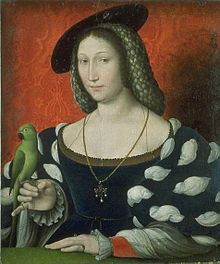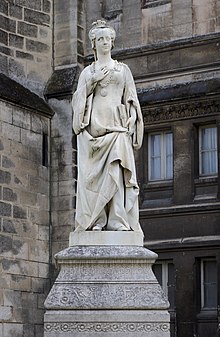Marguerite de Navarre
Appearance



Marguerite de Navarre (French: Marguerite d'Angoulême, Marguerite d'Alençon; 11 April 1492 – 21 December 1549), also known as Marguerite of Angoulême and Margaret of Navarre, was the princess of France, Queen of Navarre, and Duchess of Alençon and Berry. She was married to Henry II of Navarre. Her brother became King of France, as Francis I, and the two siblings were responsible for the celebrated intellectual and cultural court and salons of their day in France. As an author and a patron of humanists and reformers, she was an outstanding figure of the French Renaissance.
| This article on an author is a stub. You can help out with Wikiquote by expanding it! |
Quotes
[edit]L'Heptaméron (1558)
[edit]- I have heard much of these languishing lovers, but I never yet saw one of them die for love.
- First Day, Novel VIII (trans. W. K. Kelly)
- To me it seems much better to love a woman as a woman, than to make her one's idol, as many do. For my part, I am convinced that it is better to use than to abuse.
- Second Day, Novel XII (trans. W. K. Kelly)
- No one ever perfectly loved God who did not perfectly love some of his creatures in this world.
- Second Day, Novel XIX (trans. W. K. Kelly)
- Variant translation by Samuel Putnam in Marguerite of Navarre (1935), p. 53:
- Never shall a man attain to the perfect love of God who has not loved to perfection some creature in this world.
- Un malheureux cherche l'autre.
- As two unhappy people often will, the one sought out the other.
- Third Day, Novel XXI (trans. P. A. Chilton)
- Variant translation: Misery loves company.
- He who knows his own incapacity, knows something, after all.
- Third Day, Novel XXVIII (trans. W. K. Kelly)
- Man is wise ... when he recognises no greater enemy than himself.
- Third Day, Novel XXX
- God always helps madmen, lovers, and drunkards.
- Fourth Day, Novel XXXVIII (trans. W. K. Kelly)
- Mariage est un état de si longue durée, qu'il ne doit être commencé légèrement, ne sans l'opinion de nos meilleurs amis et parents.
- Marriage is an estate of long duration, and one which should not be entered into lightly or without the approval of our closest friends and relatives.
- Fourth Day, Novel XL (trans. P. A. Chilton)
- When one has one good day in the year, one is not wholly unfortunate.
- Fourth Day, Novel XL
- Blessed, unquestionably, is he who has it in his power to do evil, yet does it not.
- Fifth Day, Novel XLII (trans. W. K. Kelly)
- Though jealousy be produced by love as ashes are by fire, yet jealousy extinguishes love, as ashes smother the flame.
- Fifth Day, Novel XLVIII (trans. W. K. Kelly)
- I never knew a mocker who was not mocked, ... a deceiver who was not deceived, or a proud man who was not humbled.
- Sixth Day, Novel LI (trans. W. K. Kelly)
- Ilz font semblant de n'aymer poinct les raisins quand ilz sont si haults, qu'ilz ne les peuvent cueillir.
- They cry sour grapes when the object of their desires is beyond their grasp.
- Sixth Day, Novel LIII (trans. P. A. Chilton)
- Some there are who are much more ashamed of confessing a sin than of committing it.
- Sixth Day, Novel LX (trans. W. K. Kelly)
Quotes about Marguerite
[edit]- The principal themes of the [Heptaméron] are rape, seductions bordering on rape, incest and numerous infringements of the sex and marriage codes of aristocratic Europe.
- Paul A. Chilton, Introduction to The Heptameron (New York: Penguin, 1984)
- The first modern woman.
- Samuel Putnam, Marguerite of Navarre (New York: Coward McCann, Inc., 1935)
External links
[edit]- The Heptameron of Margaret, Queen of Navarre at UPenn Digital Library

